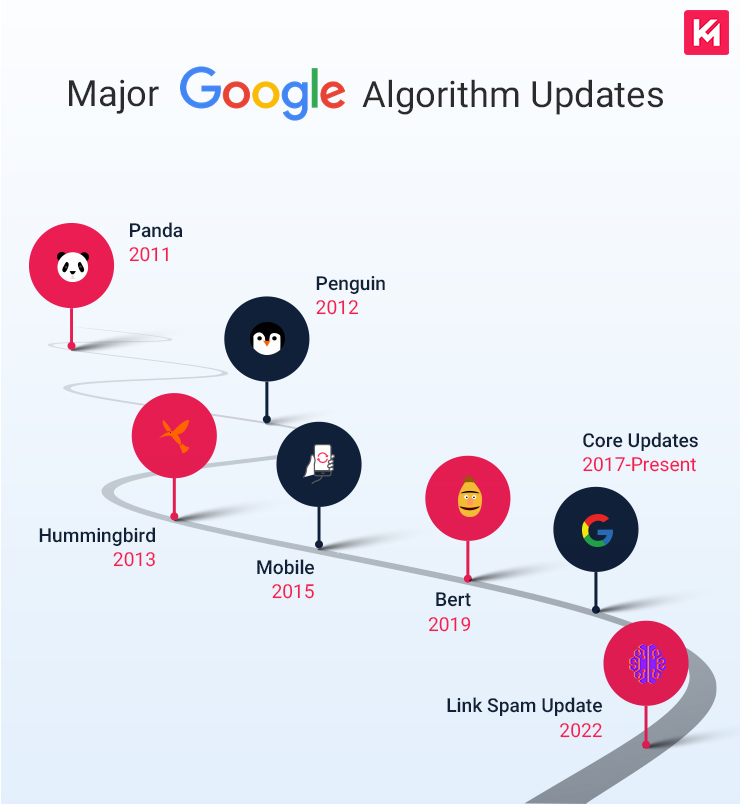Elevate Your SEO Game in the Age of Google's Algorithm Updates
Elevate Your SEO Game in the Age of Google's Algorithm Updates
Blog Article
Comprehending the Implications of Google's Algorithm Updates on SEO Positions and methods
In the ever-evolving landscape of seo (SEARCH ENGINE OPTIMIZATION), the ramifications of Google's formula updates have become a focal point for businesses and marketers aiming to keep or boost their on-line presence (Google’s Algorithm Updates). As Google proceeds to fine-tune its formulas to supply customers with the most relevant and high-grade search results, comprehending exactly how these updates influence SEO approaches and rankings is critical. From the subtle shifts in keyword methods to the extra pronounced emphasis on user experience, the interaction in between formula updates and SEO practices introduces a complex web of considerations that require continuous caution and flexibility
Development of Google's Formula

The Panda update, launched in 2011, targeted low-grade web content and penalized websites with replicate, thin, or irrelevant web content. Penguin, launched a year later, resolved web link spam by devaluing manipulative web links. Hummingbird, introduced in 2013, marked a change towards semantic search, comprehending the context and intent behind individual queries as opposed to simply matching key phrases.
These updates required internet site owners and SEO experts to focus on user experience, quality web content, and all-natural link building strategies to boost their rankings in Google's search outcomes. The evolution of Google's algorithm underscores the search engine's commitment to providing appropriate and useful web content to customers while punishing methods aimed solely at gaming the system.
Influence On Search Phrase Strategy
With the evolution of Google's algorithm towards prioritizing user experience and content relevance, the Influence on Key words Technique has become increasingly essential for site owners and SEO professionals seeking to align with these search engine updates. Keyword phrases are no more nearly matching search terms however comprehending customer intent and supplying beneficial content. Google's updates, such as BERT and RankBrain, concentrate on natural language processing and context, making keyword technique much more sophisticated.

In Addition, with Google's focus on semantic search and user-focused content, keyword phrase padding is no more reliable and can also harm rankings. Instead, incorporating key phrases normally right into high-quality, appropriate material is crucial. By recognizing the influence of Google's formula updates on key words technique, site owners can improve their SEO initiatives and enhance their presence in search outcomes.
Changes in Web Content Optimization
As the landscape of seo remains to advance, internet site proprietors and SEO professionals are seeing significant shifts in content optimization techniques. In the wake of Google's formula updates, there has actually been an expanding focus on producing top notch, pertinent, and reliable web content that gives worth to individuals. This implies that just stuffing keywords right into write-ups is no more reliable; rather, material must be well-written, engaging, and tailored to fulfill the demands of the target market.
Furthermore, there is a better emphasis on user experience and fulfillment, with search engines rewarding sites that use a smooth surfing experience and valuable information. As a result, material optimization currently entails not just including relevant keyword phrases normally however additionally structuring web content in a means that is very easy to navigate and read.
Significance of Individual Experience
Enhancing individual experience on a web site is vital in modern-day search engine optimization techniques, acting as a crucial consider identifying a site's exposure and success in online search engine rankings. Individual experience includes various elements such as site rate, mobile-friendliness, instinctive navigating, and interesting web content (Google’s Algorithm Updates). Google's read here formulas progressively prioritize websites that offer a seamless and satisfying customer experience, as it straight correlates with user satisfaction and retention
A positive customer experience not only improves a website's search engine optimization efficiency however also contributes to greater conversion prices and client loyalty. Internet sites that are very easy to browse, visually appealing, and provide valuable web content are more probable to attract and retain site visitors. In comparison, web sites with bad user experience metrics might endure from high bounce rates and reduced dwell times, signifying to online search engine that the material may not be pertinent or appealing for individuals.
For that reason, buying maximizing individual experience is important for keeping a competitive edge in the ever-evolving digital landscape. By prioritizing user-centric layout and capability, websites can boost their online search engine rankings and eventually drive more organic website traffic and conversions.
Methods for Future Adaptation
Moving on in the swiftly evolving landscape of search engine optimization, it is vital for businesses to take on innovative approaches for future adaptation. One vital technique is to concentrate on producing top quality, pertinent content that gives value to individuals. This web content should be enhanced for search phrases that align with individual intent and need to be frequently upgraded to stay competitive and present.
In addition, organizations ought to prioritize mobile optimization to deal with the raising variety of users accessing the web by means of mobile tools. Making certain that websites tons swiftly, are very easy to browse, and provide a seamless user experience on smart phones can assist enhance search positions and customer satisfaction.
Additionally, leveraging data analytics and individual habits understandings can assist services recognize their target market better and tailor their additional reading SEO methods appropriately. By checking essential performance signs and readjusting approaches based on data-driven understandings, businesses can remain in advance of the contour and adjust to the ever-changing SEO landscape. Accepting emerging modern technologies, such as voice search optimization and artificial knowledge, can likewise be helpful for future-proofing SEO strategies.
Verdict

With the evolution of Google's algorithm towards prioritizing individual experience and web content relevance, the Impact on Key phrase Approach has become significantly crucial for internet site owners and Search engine optimization specialists seeking to line up with these search engine updates. Google’s Algorithm click reference Updates. Keyword phrases are no longer just regarding matching search terms however comprehending individual intent and providing important content. Google's formulas increasingly prioritize sites that offer a seamless and rewarding customer experience, as it straight associates with user satisfaction and retention
In comparison, web sites with bad user experience metrics might experience from high bounce rates and low dwell times, signaling to look engines that the material may not be pertinent or appealing for customers.
The development of the algorithm has actually shifted emphasis towards customer experience and high quality content, influencing keyword method and content optimization.
Report this page